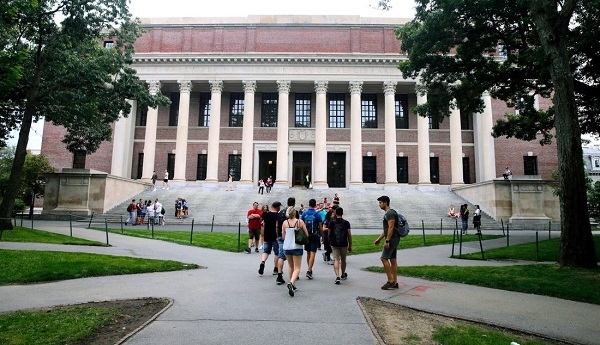Harvard, MIT Sue US administration Over Rule Barring International Students
09 Jul 2020 16:40:27
Boston, July 09: The Harvard and the Massachusetts Institute of Technology filed a lawsuit in District Court in Boston Wednesday morning against the U.S. Department of Homeland Security and U.S. Immigration and Customs Enforcement. Earlier, the US Immigration and Customs Enforcement (ICE) issued a new rule forcing international students to transfer or leave the US if their schools hold online-only classes.

The lawsuit seeks a temporary restraining order and preliminary and permanent injunctive relief to bar DHS and ICE from enforcing federal guidelines barring international students attending colleges and universities offering only online courses from staying in the United States.
Harvard and MIT have filed pleadings in the US District Court in Boston seeking a temporary restraining order prohibiting enforcement of the ICE order. (4/6)
— Harvard University (@Harvard) July 8, 2020
Harvard University President Lawrence Bacow said in an email to affiliates that the “order came down without notice—its cruelty surpassed only by its recklessness. We believe that the ICE order is bad public policy, and we believe that it is illegal.”
"We will pursue this case vigorously so that our international students, and international students at institutions across the country, can continue their studies without the threat of deportation," Bacow said in a statement.
The Harvard lawsuit argues that the guidelines violated the Administrative Procedure Act by failing to consider “important aspects of the problem” in advance of its release, failing to provide a reasonable basis for the policy, and failing to adequately notify the public. US Immigration and Customs Enforcement (ICE) announced on Monday (Jul 6) that international students on F-1 and M-1 student visas must leave the country or risk getting deported if all their fall classes are online.
MIT said that ICE’s order disrupted the lives of international students and jeopardized their academic and research pursuits. "ICE is unable to offer the most basic answers about how its policy will be interpreted or implemented. And the guidance comes after many US colleges and universities either released or are readying their final decisions for the fall – decisions designed to advance their educational mission and protect the health and safety of their communities," MIT added.
“Active students currently in the United States enrolled in such programs must depart the country or take other measures, such as transferring to a school with in-person instruction to remain in lawful status. If not, they may face immigration,” the statement read. International students were previously allowed flexibility when campuses closed and learning went online in the spring and summer semesters due to COVID-19.
International students attending U.S. colleges & universities contribute $41 billion to the economy each year, an additional $10 billion in spending outside of tuition, and are responsible for supporting over 458,000 jobs. There were more than one million international students in the United States for the 2018-19 academic year. The largest number of international students comes from China, followed by India, South Korea, Saudi Arabia, and Canada.